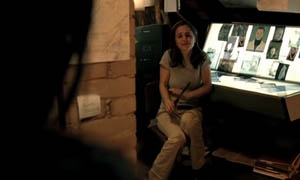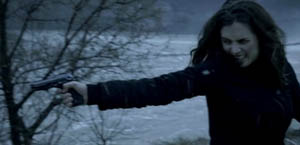|
There was a real-life Alphabet Killer, who murdered three young girls with matching first and last initials during the early 1970s. This film isn't really about the actual case, despite a handful-a small handful, mind you-of specific details that it borrowed (not including the actual period; the film is set in modern times). Nor is it a thriller, despite the packaging that seems to want us to think otherwise. Instead it's a police detective story about an emotionally disturbed cop compelled to solve the case. It's got a lot of good things going for it, which don't quite add up to an altogether satisfying film. 
Our main character is Megan Paige, a detective with adult onset schitzophrenia, and yes, I admit I sought this film out because she's played by Eliza Dushku, whom I like. She may never win an Oscar, but she can be a solid actress in the right role, having either developed an affinity for characters with an unstable edge, or having been typecast into playing them. As the story opens, she's investigating the murder of young Carla Castillo, whose body has been found in the neighboring town of Churchville. Megan believes the three "C"s are unlikely to be coincidence, and favors a serial killer theory. Her assurance of this, however, may have a disturbing reason behind it. Apophenia, or the tendency to identify meaningless patterns within data, is particularly pronounced in schizophrenics, and as the stress of the case begins to take its toll, Megan begins to manifest more and more symptoms, including visions of the dead girl. After a suicide attempt, Megan finds herself in therapy and on antipsychotics. But two years later, another murder occurs with the same earmarks, and Megan cojoles her way back into the investigation as an advisor. I found much to enjoy about this film, which only served to make its missteps more frustrating. With a little script doctoring, this could've been quite a solid crime drama. First of all, without trying to spoil anything, I'll say that it was a mistake to make the film into a whodunit, since the list of suspects is vanishingly small and most viewers will likely identify the killer within minutes of his appearance. Possibly most frustrating of all is the fact that the ultimate motive for the murders is half of a really interesting idea. The other half is regrettably predicated upon a staggering coincidence; surely the better half of the idea could've been preserved and a better setup, one which does not punt suspension of disbelief right into a drainage pond, could've been employed instead. There's also the matter of Megan's ghostly visions, though I disagree with other reviews I've read that stated that the film was ultimately unclear on whether or not the ghosts were meant to be real. Nothing that happens in the film indicates anything other than mental illness; the spooks do not provide clues or otherwise do anything not fully explicable by the medical diagnosis. That said, it was probably a bad idea to make them look so much like modern movie ghosts. This film isn't a thriller, and it doesn't need to be. And finally, as is so often the case, there's a piece of voice-over narration at the very end which would've been better off on the recording-room floor. It's almost as if the producers were worried about making the wrap-up too much of a downer and decided there needed to be some comforting equivocation. Personally, I disagree, though if the dialogue in question had been less ham-handed, I might not have minded quite so much. 
What's left? Well, the photography and performances were quite good, and smacked of a movie with greater potential. While Michael Ironside's police captain was a bit too slimy in his first scene, nothing about the overall acting feels B-grade, and I thought Miss Dushku acquitted herself nicely; my only complaint being that she seems too young and pretty to play a cop. Maybe that's just personal bias. Frankly, I'd like to see her in more films that don't feel the need to keep her more or less roped into the supernatural or horror genres. So much of this film lies outside of those boundaries that it's not hard to imagine her playing a role that's just plain all the way out. Unfortunately, the effectiveness of the film itself is likely to prevent it from becoming much in the way of a stepping-stone. In conclusion, I must give mention to what almost seems like a postmodern joke on the part of the filmmakers. After failing to secure cooperation from Ironside's dickheadish captain, Megan's partner suggests that her feminine wiles might have availed them, to which she sarcastically responds "Did you want me to shake my tits at him?" before admitting, "I'd have done it if I'd have thought it would help." Dushku, after years of denying she'd ever do nudity onscreen, conceded to a blink-and-you'll-miss-it topless scene in The Alphabet Killer, so brief and superfluous that it could've been omitted entirely and the film would've been none the worse for it. Maybe I'm a cynic, but perhaps, like her character, she thought it might help. Hell, it probably didn't hurt. -review by Matt Murray
|
|
||||||||